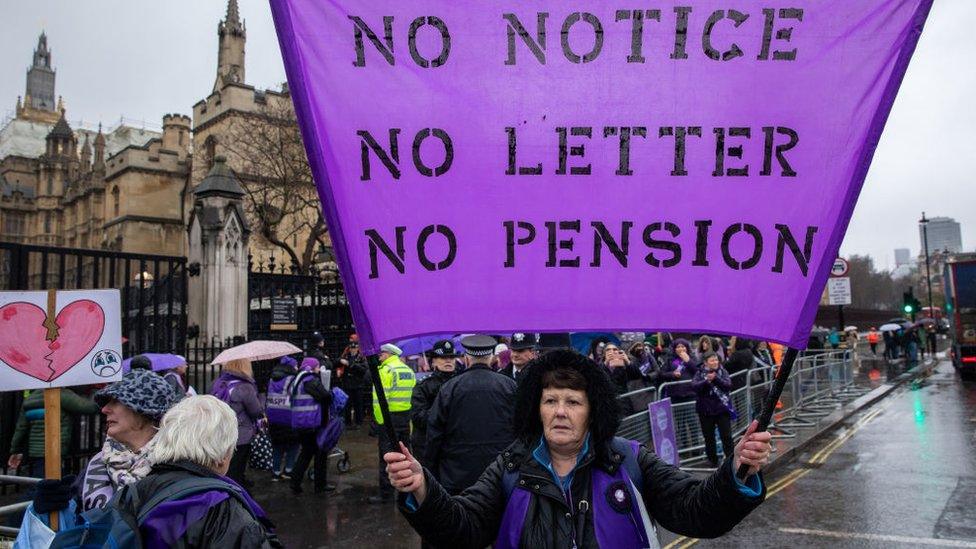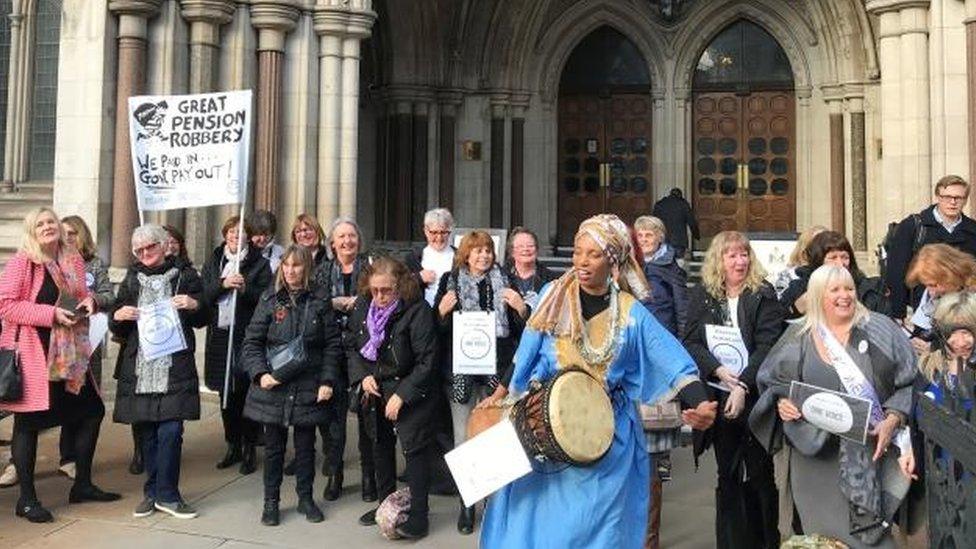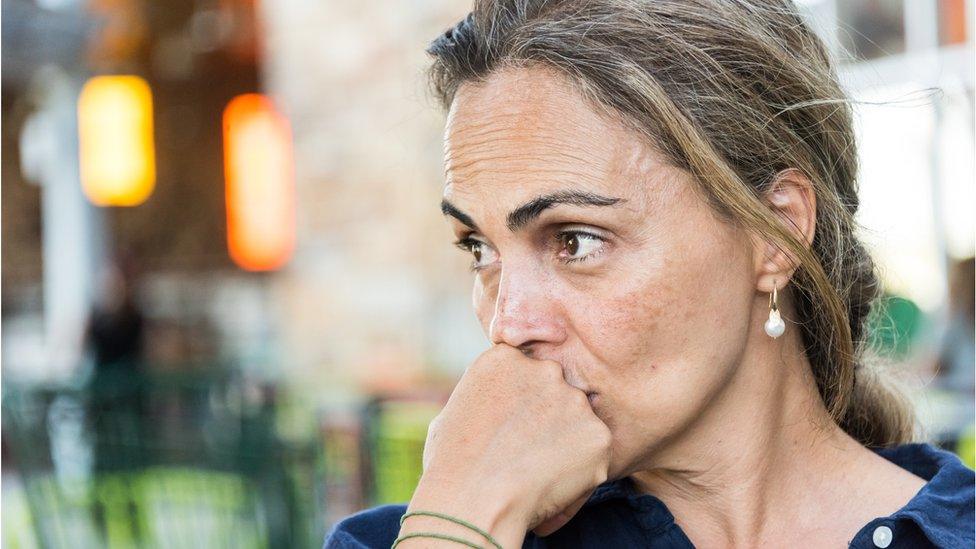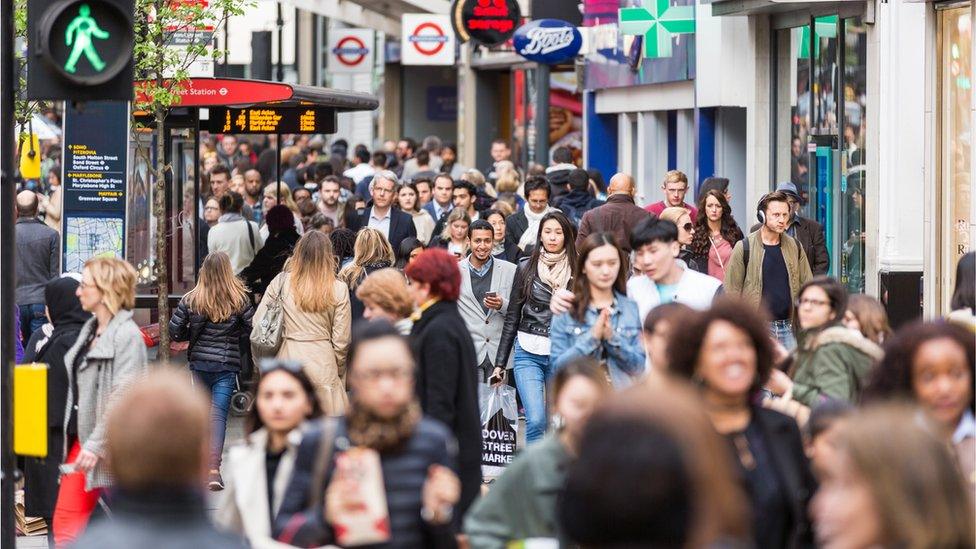Defeat for women in state pension age challenge
- Published
"It makes me angry. It makes me very emotional"
Campaigners have lost a significant legal battle against the government's handling of the rise in women's state pension age.
The retirement age for women rose from 60 to 65, in line with men, and will go up to 66 by 2020, and to 67 by 2028.
Women born in the 1950s claim the rise is unfair because they were not given enough time to make adjustments to cope with years without a state pension.
They argued the changes were discrimination, but judges disagreed.
In a summary of the High Court's decision, the judges said: "There was no direct discrimination on grounds of sex, because this legislation does not treat women less favourably than men in law. Rather it equalises a historic asymmetry between men and women and thereby corrects historic direct discrimination against men."
The court also rejected the claimants' argument that the policy was discriminatory based on age, adding that even if it was "it could be justified on the facts".
To chants of "the fight goes on" from supporters, Joanne Welch, who led the campaign, said outside court: "Where do we go from here? Well, where will the government go from here is the better question."
She referred to Prime Minister Boris Johnson's pledge during the Tory leadership campaign to look at the state pension age issue with "fresh vigour", adding: "We will be holding you to that undertaking."
She said she was "rather puzzled" by the court's ruling, but added: "We can take this, we've got broad shoulders."
A spokesman for the Department for Work and Pensions said: "We welcome the High Court's judgment. It has always been our view that the changes we made to women's state pension age were entirely lawful and did not discriminate on any grounds."
What was the case about?
Up until 2010, women received their state pensions at the age of 60 but that has been rising since then. While most campaigners support pension age equality, they argued that the government was discriminatory in the way it has introduced it.
The result has been that some women who thought they would retire and receive a state pension at 60 found that they would have to wait longer - for some a wait of more than five years. That resulted in financial hardship for many.
Those affected were born in the decade after 6 April, 1950, but those born from 6 April 1953 were particularly affected and have been the focus of much of the campaign.

In June, the judicial review in the High Court heard the claim from two members of the Backto60 group who said that not receiving their state pension at the age of 60 had affected them disproportionately.
They argued that many women took time out of work to care for children, were paid less than men and could not save as much in occupational pensions, so the change had hit them harder.
It is estimated that 3.8 million women were in this position, with some potentially losing out on more than £40,000.
The Backto60 group is seeking repayment of all the pensions people born in the 1950s would have received if they had been able to retire earlier. It argues that the speed of the change and what it calls the lack of warnings has disadvantaged millions of women.
However, the government has estimated that a reversal of the pension changes in the Acts of Parliament of 1995 and 2011 would cost £215bn over the period 2010-11 to 2025-26.
About £181bn of that would be money potentially owed to women and the rest to men.
It has said the move to make the state pension age the same for men and women was a "long-overdue" move towards gender equality, and had been clearly communicated to those affected.

'I could have paid my bills'

Krissy Abbott, with her dog Jazz, says she is angry about the situation
Krissy Abbott was born in April 1954 so had expected to be receiving her state pension well before now. Instead, it will come in November.
Mrs Abbott, from Essex, said the loss of her husband, Alan, as well as difficulties with benefits applications meant she was depending on the charity of others last year.
"The only thing I had was the food bank and some very good neighbours of mine. They knew how much I thought of [my dog] Jazz. They brought round tins of dog food for him," she said.
"I had a gas cooker in the kitchen and Jazz and I used to spend our time in the kitchen keeping warm. You just survive."
She said life would have been different had she been in receipt of her state pension.
"You could have had the heating, you could have had hot food, a shower, a bath, a simple thing like having a kettle and making a hot drink. It would have made such a difference. I could have paid my bills," she said.
"It makes me angry. It makes me very emotional."

'Saddened by stories'
Campaigners have lobbied MPs, and call regular public protests to raise awareness of their situation.
To gasps in the courtroom when declaring the ruling, Lord Justice Irwin and Mrs Justice Whipple said: "The court was saddened by the stories contained in the claimants' evidence.
"But the court's role was limited. There was no basis for concluding that the policy choices reflected in the legislation were not open to government. In any event they were approved by Parliament.
"The wider issues raised by the claimants about whether the choices were right or wrong or good or bad were not for the court. They were for members of the public and their elected representatives."
The judges also said there was nothing written into the law that ordered specific notification about the pension age changes.
The Backto60 group has taken this legal action to demand "the return of their earned dues". The separate Women Against State Pension Inequality (Waspi) group is calling for a "bridging" pension to cover the gap from the age of 60 until their state pension is paid.
- Published18 December 2024

- Published30 November 2018

- Published5 November 2018

- Published19 July 2017
